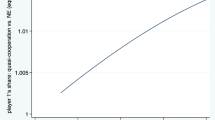Abstract.
This paper reports results of an experiment design ed to investigate the nature of cooperation and punishment. Subjects are matched in a series of two-person, two-stage games with a sequential equilibrium that supports first-stage cooperation with a credible threat of subsequent punishment. Participants sometimes used a consistent punish/reward strategy, and when they did, cooperation rates increased dramatically. The results thus contradict “payoff relevance”: second-stage behavior can be influenced by first-stage outcomes that have no effect on the payoff structure. Nevertheless, high cooperation rates were often not observed, even with a Pareto undominated “punishment” equilibrium in the second stage.
Similar content being viewed by others
Author information
Authors and Affiliations
Additional information
Received: November 1993/final version: July 1995
Rights and permissions
About this article
Cite this article
Davis, D., Holt, C. Equilibrium cooperation in two-stage games: Experimental evidence. Game Theory 28, 89–109 (1999). https://doi.org/10.1007/s001820050100
Issue Date:
DOI: https://doi.org/10.1007/s001820050100




